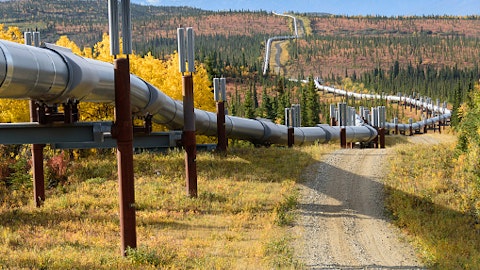Grant Kadavy: Yes, I think as Todd’s mentioning, specifically, one of the major changes that we saw was in Nebraska, where coming off a crop year, where we had a lack of production in Nebraska, we’ve now seen that to be one of the areas where we’ve had the greatest year-over-year change in production. And production levels have improved dramatically. If you look at where corn basis was at its highs in last year in Nebraska, basis levels were well in excess of a dollar over the CME [ph]. Basis levels have, again, I say normalized quite a bit to where we’ve seen values come off close to a dollar a bushel. I think once you get post harvest, a farmer puts their crop away, you’re going to see traditional sort of ups and downs and slight movements in the market, but we don’t expect that we’re going to see basis levels return to the values that we saw in the last few years.
Andrew Strelzik: Great. Thank you very much.
Todd Becker: Thank you.
Operator: The next question is from Kristen Owen with Oppenheimer. Your line is open. Kristen Owen with Oppenheimer. Your line is open.
Kristen Owen: Hi, thank you for taking the question. Two quick ones for me. First on MSC protein, if you can speak a little bit to the spread over DDGS [ph]. And then Todd, you mentioned sort of looking out the soybean meal versus corn ratio. Soybean stocks very tight, corn not so much. So just wanted to ask how much pricing you’re willing to lock in for 2024?
Todd Becker: Well, most people are starting to move from flat price to plenty of sales on basis. We don’t see extended rather than a few of our longer term customers, like the pet business that we redid and we’re awarded for 2024 again, a lot of the business is done basis and a lot of it’s done quarter-by-quarter more than it is done for the whole year. Kind of when you look out forward, even out forward, the spread between corn and meal continues to remain strong, which means DDGS against meal remain strong. You can go all the way out to April or go out to further than that, and you’re well over $200 a ton spread. So we’ll have to wait and see what corn does. But it’s advantage. Our business that we’ve outlined.
I mean this is as we’ve indicated, we had a thesis that the world’s protein short in the world was oil short. That was a long thesis that we’ve developed over time. And it’s kind of playing out that way with genetics and corn and acres and yields relative to the tightness in soy. So it’s kind of playing out nicely. We went through some years where it was the opposite. So kind of remember as we were ramping up, some of that was the opposite was happening. We even saw that as of late, even in the last kind of 120 days. But finally we’ve readjusted to the current USDA numbers and I think that’ll stay around for a while. We’ll wait and see. I think the next thing, big thing we’ll look at as acreage for 2024 and what’s the shift and what’s advantage in any given state.
But at this point it doesn’t look like it’s going to change much. So we’re pretty happy about that position.
Kristen Owen: And then sort of a related question, just given the advantage of corn talking about the sugar markets and the favorable backdrop for dextrose, no additional capacity coming online there except for your own. I’m just wondering if you can talk a little bit about how quickly you can get Shenandoah was scaled up in the first half of the year. And apologies if you did discuss this, but just where you are in terms of an offtake discussion there?
Todd Becker: Yes. So relative to the lower corn prices, they’re still relatively high towards that $5 bushel. So dextrose pricing has remained steady to strong. We’ve seen customers who call us say they’ve been put on allocation from the traditional players. So there’s definitely a demand and growing demand quite frankly, that from the – all the way from beverage to chemical use down into candy and confectionery. And then you, so ours is coming on next year. It’s not going to be dramatically changed the supply and demand balance sheet for dextrose in 2024. There’s one other project that was I think announced a few years ago over in Fort Dodge of 200 million pounds or something like that. But generally we think we’re in a strong position.
Off takes, we have, we’re negotiating at this point with several customers on want to make sure that we hit the window correctly because as you are commissioning a brand new technology and we learned from MSC take longer than we probably expected. So we’re going to be very careful. But generally speaking, we are trying to get most of our production that we’re going to produce in 2024 spoken for and we have enough discussions going on for that to happen and it’s bit of a, I think we’ll get some of that done by the end of the year as we negotiate. As we say, this is kind of our, I will tell you a bit of a motto of ours. If you – if we buy product from you and you use dextrose, then we’re going to have a bilateral arrangement that you’ll be buying dextrose from us or else we won’t buy the product and we’ll look elsewhere.
So we feel like we buy a lot of product that’s made using dextrose into our operations. And so that’s our first, but we have great partners. So it’s certainly not anything that is antagonistic. It’s just the fact that we believe we’re finally in a position to have some bilateral arrangements. And that’s really where our first dextrose will go as we scale up and get food grade certified in the last half of the year. And then we move more into the beverage and other markets as well. So we’re really happy about that. As you can see, there’s tons of new or lots of new technologies that are coming online as well that are going to take more and more dextrose over the next five years to 10 years. And we just think we’re in a great position.
We will show the world what this platform can really do. And the margin structure is extreme there’s nothing stronger from a margin structure than there is to make dextrose at our plant and the first of its kind in the world will happen next quarter.
Kristen Owen: Thank you so much.
Todd Becker: Thank you.
Operator: No further questions at this time. I’ll turn it to Todd Becker for any closing remarks.
Todd Becker: Well, thanks for being patient with us. A lot of lot of questions. We had a lot to cover. We’re on track. We feel like we have more to unlock in our core business, which I think that’s a renewed focus on that in terms of getting more oil, getting more alcohol, getting more distillers grains, but really starting to gain momentum in our new technologies. Yes, we wish we could go faster on building more. We have the demand for it. We’ve identified the demand for all of our products. And next stop is clean sugar in Shenandoah in the first quarter. Starting to decommission that plant and that’s really the game changer. And then we get into 2025 and we see great earnings start to transpire from some of our carbon initiatives.
So, overall, on track, feel like this was a good quarter to get a win on the board, operations returning back to normal, but more to unlock there as well. So we appreciate all your support and we’ll see you next quarter. Thank you.
Operator: This concludes today’s conference call. Thank you for participating. You may now disconnect.
Follow Green Plains Partners Lp (NASDAQ:GPP)
Follow Green Plains Partners Lp (NASDAQ:GPP)
Receive real-time insider trading and news alerts





